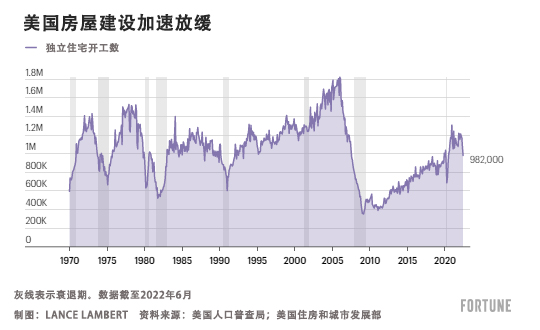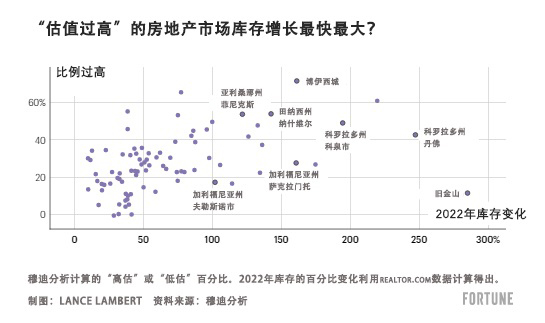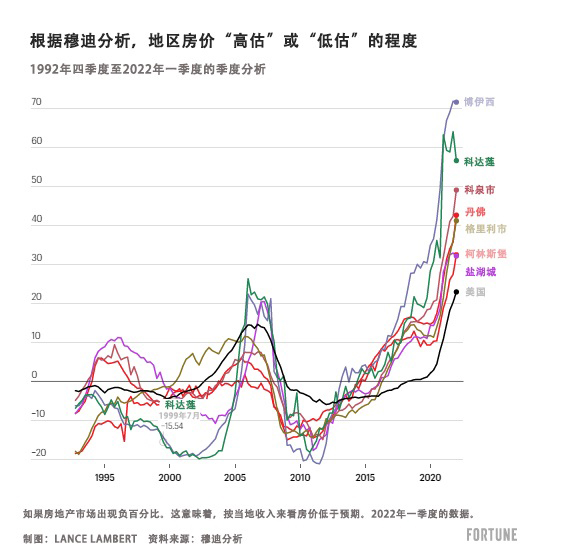2011年开始的房地产上升周期已经正式结束。简而言之:房地产进入衰退期。
7月19日,我们得知,6月房屋建筑商独立住宅开工数为98.2万套。自今年2月以来下降了19%,与2021年6月相比下降了16%。虽然算不上“泡沫破裂”,但很明显,建筑商正在收缩业务。从历史经验看,这说明房地产周期发生反转。建筑商向来要与存量房竞争,随着库存激增,房屋建筑商就会开始减少开工。
“巅峰时期的欢快已经离我们远去。曾经席卷各大房地产市场的(房屋)高价红利逐渐回吐。”约翰·伯恩斯房地产咨询公司(John Burns Real Estate Consulting)的研究主管小里克·帕拉西奥斯表示。
房屋库存将继续增加,新房建设将继续放缓。至少约翰·伯恩斯房地产咨询公司如此认为,该公司主要向建筑商和投资者提供咨询服务。在这一过程中,房地产持续衰退(即房地产市场萎缩)可能拉低泡沫存在地区的房价。帕拉西奥斯称,2023年和2024年很多泡沫市场都会大幅降价,其中包括菲尼克斯、纳什维尔、西棕榈滩、拉斯维加斯和奥斯汀等地。帕拉西奥斯指出,在爱达荷州博伊西,房价最早可能在今年12月就会同比下跌。
“某些地方的建筑商已经(决定)停止浇筑楼板,浇筑楼板是房屋开工的明确标志。在某些市场上,感觉像是(房地产泡沫破灭)。”帕拉西奥斯说。

今年春天抵押贷款利率飙升后不久,住房市场就陷入了“调整期”。很容易发现,利率提升如何让诸多潜在买家望而却步。如果借款人在12月以3.1%的利率获得50万美元抵押贷款,每月就要偿还2135美元的本金和利息。如果借款人以现在的30年期固定利率抵押贷款平均利率(5.51%)获得50万美元抵押贷款,每月就要还2839美元。
房地产衰退对市场造成了严重冲击,不过各个市场受到的影响并不均衡。西部山区、西海岸和西南部房地产市场受到的打击格外沉重。看看库存变化就能够发现:过去六个月,丹佛的库存激增了247%,而匹兹堡只有18%。紧随丹佛之后的是奥斯汀(220%);科罗拉多斯普林斯(195%);加利福尼亚州斯托克顿(175%);还有博伊西(161%)。
实际情况到底怎样?西部房地产市场恰好也是美国最“高估”的市场之一。随着过去两年房地产大规模繁荣,很多供应更紧张的市场上房价涨势惊人。过去两年,博伊西的房价上涨了53%,也导致当地的房价远远超过了历史上市场基本面可以支撑的水平。事实上,穆迪分析(Moody's Analytics)认为博伊西是美国房价最“高估”的市场。
穆迪分析预计,未来一年在博伊西和奥斯汀等被严重“高估”的房地产市场,房价将下跌5%至10%。穆迪分析预计全美房价同比增长为0%。然而如果经济衰退来袭,穆迪分析预测被严重“高估”的市场中房价可能跌去15%至20%,而全美房价将下跌约5%。

奥斯汀和菲尼克斯等泡沫市场收缩更快还有另一个原因:投资者。
过去两年,投资者纷纷涌入美国房地产市场。爱彼迎(Airbnb)房东和夫妻房东等小玩家加入。炒房客返回市场。有像黑石(Blackstone)一样的机构,还有Zillow之类的网络平台。最受欢迎的地点在哪?正是遍及西部山区、西南和东南部火热的房地产市场。
然而,随着新兴城市房地产市场开始收缩,第一批逃离的也是投资者。
“投资者有时喜欢组团行动。如果2022年的菲尼克斯房地产不再是人们眼中很酷的投资,那就可能迅速对房屋销售产生巨大影响。如果很多投资者决定卖出……那就不妙了。”菲尼克斯的独立房地产分析师约翰·韦克告诉《财富》杂志。

当然,本轮房地产衰退其实是有意为之。
今年早些时候,美联储(Federal Reserve)从量化宽松(即购买债券)转向量化紧缩(即出售债券)。金融市场上的10年期国债和抵押贷款利率立刻走高。这正是美联储想要的结果:如果抵押贷款利率上升,就能够让疫情中推高通胀的火热房地产市场降温。
“要我说的话,如果你是购房者,或者是想买房的年轻人,就需要做点调整。我们要恢复到供需正常、通胀重新降至低位、抵押贷款利率也降至低位的状态。”美联储主席杰罗姆·鲍威尔在6月向记者表示。
帕拉西奥斯认为,美联储住房“调整”实际意思是“房价下跌”。虽然美联储没有直接表态,但帕拉西奥斯表示,业内很多人预计这正是下一步要面临的情况。
帕拉西奥斯说,房地产持续收缩加上态度坚定的美联储,意味着衰退注定到来。从历史上看,美联储引发的衰退始于房地产等利率敏感行业。通常情况过程如此:抵押贷款利率飙升迅速导致房屋销售减少。然后库存急剧上升,房屋建筑商收缩。随后,大宗商品和耐用品需求均下降。当然,房地产衰退也会造成裁员。
“阅读保罗·沃尔克文章后学到的教训是,20世纪70年代美联储就是这么把事情搞砸的。如果面对通胀问题有红灯、绿灯的心态,就永远也无法摆脱通胀思维……如果过去一个月认真听美联储的表态就可以发现,他们自己也非常害怕会这样。”帕拉西奥斯说。(财富中文网)
译者:梁宇
审校:夏林
2011年开始的房地产上升周期已经正式结束。简而言之:房地产进入衰退期。
7月19日,我们得知,6月房屋建筑商独立住宅开工数为98.2万套。自今年2月以来下降了19%,与2021年6月相比下降了16%。虽然算不上“泡沫破裂”,但很明显,建筑商正在收缩业务。从历史经验看,这说明房地产周期发生反转。建筑商向来要与存量房竞争,随着库存激增,房屋建筑商就会开始减少开工。
“巅峰时期的欢快已经离我们远去。曾经席卷各大房地产市场的(房屋)高价红利逐渐回吐。”约翰·伯恩斯房地产咨询公司(John Burns Real Estate Consulting)的研究主管小里克·帕拉西奥斯表示。
房屋库存将继续增加,新房建设将继续放缓。至少约翰·伯恩斯房地产咨询公司如此认为,该公司主要向建筑商和投资者提供咨询服务。在这一过程中,房地产持续衰退(即房地产市场萎缩)可能拉低泡沫存在地区的房价。帕拉西奥斯称,2023年和2024年很多泡沫市场都会大幅降价,其中包括菲尼克斯、纳什维尔、西棕榈滩、拉斯维加斯和奥斯汀等地。帕拉西奥斯指出,在爱达荷州博伊西,房价最早可能在今年12月就会同比下跌。
“某些地方的建筑商已经(决定)停止浇筑楼板,浇筑楼板是房屋开工的明确标志。在某些市场上,感觉像是(房地产泡沫破灭)。”帕拉西奥斯说。
今年春天抵押贷款利率飙升后不久,住房市场就陷入了“调整期”。很容易发现,利率提升如何让诸多潜在买家望而却步。如果借款人在12月以3.1%的利率获得50万美元抵押贷款,每月就要偿还2135美元的本金和利息。如果借款人以现在的30年期固定利率抵押贷款平均利率(5.51%)获得50万美元抵押贷款,每月就要还2839美元。
房地产衰退对市场造成了严重冲击,不过各个市场受到的影响并不均衡。西部山区、西海岸和西南部房地产市场受到的打击格外沉重。看看库存变化就能够发现:过去六个月,丹佛的库存激增了247%,而匹兹堡只有18%。紧随丹佛之后的是奥斯汀(220%);科罗拉多斯普林斯(195%);加利福尼亚州斯托克顿(175%);还有博伊西(161%)。
实际情况到底怎样?西部房地产市场恰好也是美国最“高估”的市场之一。随着过去两年房地产大规模繁荣,很多供应更紧张的市场上房价涨势惊人。过去两年,博伊西的房价上涨了53%,也导致当地的房价远远超过了历史上市场基本面可以支撑的水平。事实上,穆迪分析(Moody's Analytics)认为博伊西是美国房价最“高估”的市场。
穆迪分析预计,未来一年在博伊西和奥斯汀等被严重“高估”的房地产市场,房价将下跌5%至10%。穆迪分析预计全美房价同比增长为0%。然而如果经济衰退来袭,穆迪分析预测被严重“高估”的市场中房价可能跌去15%至20%,而全美房价将下跌约5%。
奥斯汀和菲尼克斯等泡沫市场收缩更快还有另一个原因:投资者。
过去两年,投资者纷纷涌入美国房地产市场。爱彼迎(Airbnb)房东和夫妻房东等小玩家加入。炒房客返回市场。有像黑石(Blackstone)一样的机构,还有Zillow之类的网络平台。最受欢迎的地点在哪?正是遍及西部山区、西南和东南部火热的房地产市场。
然而,随着新兴城市房地产市场开始收缩,第一批逃离的也是投资者。
“投资者有时喜欢组团行动。如果2022年的菲尼克斯房地产不再是人们眼中很酷的投资,那就可能迅速对房屋销售产生巨大影响。如果很多投资者决定卖出……那就不妙了。”菲尼克斯的独立房地产分析师约翰·韦克告诉《财富》杂志。
当然,本轮房地产衰退其实是有意为之。
今年早些时候,美联储(Federal Reserve)从量化宽松(即购买债券)转向量化紧缩(即出售债券)。金融市场上的10年期国债和抵押贷款利率立刻走高。这正是美联储想要的结果:如果抵押贷款利率上升,就能够让疫情中推高通胀的火热房地产市场降温。
“要我说的话,如果你是购房者,或者是想买房的年轻人,就需要做点调整。我们要恢复到供需正常、通胀重新降至低位、抵押贷款利率也降至低位的状态。”美联储主席杰罗姆·鲍威尔在6月向记者表示。
帕拉西奥斯认为,美联储住房“调整”实际意思是“房价下跌”。虽然美联储没有直接表态,但帕拉西奥斯表示,业内很多人预计这正是下一步要面临的情况。
帕拉西奥斯说,房地产持续收缩加上态度坚定的美联储,意味着衰退注定到来。从历史上看,美联储引发的衰退始于房地产等利率敏感行业。通常情况过程如此:抵押贷款利率飙升迅速导致房屋销售减少。然后库存急剧上升,房屋建筑商收缩。随后,大宗商品和耐用品需求均下降。当然,房地产衰退也会造成裁员。
“阅读保罗·沃尔克文章后学到的教训是,20世纪70年代美联储就是这么把事情搞砸的。如果面对通胀问题有红灯、绿灯的心态,就永远也无法摆脱通胀思维……如果过去一个月认真听美联储的表态就可以发现,他们自己也非常害怕会这样。”帕拉西奥斯说。(财富中文网)
译者:梁宇
审校:夏林
The housing cycle—which began its upward climb in 2011—has officially turned over. Simply put: We've moved into a housing recession.
On July 19, we learned that homebuilders broke ground on 982,000 single-family homes in June. That's down 19% since February, and down 16% from the same month in 2021. While it's hardly a "blow out," it's clear builders are cutting back. Historically speaking, that's exactly what happens when a housing cycle turns over: As existing home inventory—which builders compete against—begins to spike, homebuilders start to cut back.
"Peak euphoria is behind us. We are giving back some of the euphoria [home] pricing that was rolling over every housing market," says Rick Palacios Jr., head of research at John Burns Real Estate Consulting.
Existing home inventory will continue to rise, and homebuilding will continue to slow. At least that's the view at John Burns Real Estate Consulting, which does consulting work for both builders and investors. As it does, the ongoing housing recession (i.e. a contracting housing market) could push home prices lower in bubbly regional housing markets. Indeed, many bubbly markets, Palacios says, are barreling toward price cuts in both 2023 and 2024. That includes markets like Phoenix, Nashville, West Palm Beach, Las Vegas, and Austin. In Boise, Palacios says, home prices could go negative on a year-over-year basis as soon as December.
"Builders are already [deciding] to not pour slabs in certain markets. Which is the technical trigger for a start for a home. In certain markets it will feel like [a housing bust]," Palacios says.
Soon after mortgage rates spiked this spring, the housing market slipped into a "housing correction." It's easy to see how those higher rates priced out many would-be buyers. If a borrower in December took out a $500,000 mortgage at a 3.1% rate, they'd owe a monthly principal and interest payment of $2,135. If a borrower took out a $500,000 mortgage at today's average 30-year fixed mortgage rate (5.51%), they'd get a $2,839 payment.
While this housing recession has hit markets coast to coast, it's hardly even. It's delivering a particularly hard blow to housing markets in the Mountain West, West Coast, and Southwest. Just look at the shift in inventory levels: Over the past six months, housing inventory has spiked 247% in Denver compared to just 18% in Pittsburgh. Not too far behind Denver are Austin (220%); Colorado Springs (195%); Stockton, Calif. (175%); and Boise (161%).
What's going on? These Western housing markets also happen to be among the most "overvalued" markets in the country. As the pandemic housing boom raged over the past two years, many of those markets—which were more constrained supply-wise—saw staggering home price appreciation. In Boise, home prices jumped 53% over the past two years. That took home prices there well beyond what economic fundamentals in the market would historically support. In fact, Moody's Analytics deems it the most "overvalued" market in the country.
Over the coming year, Moody's Analytics expects significantly "overvalued" housing markets like Boise and Austin to see home prices fall 5% to 10%. Nationally, Moody's Analytics expects year-over-year home price growth to be at 0%. However, if a recession hits, Moody's Analytics predicts significantly "overvalued" housing markets could see home prices drop by 15% to 20% while national home prices would fall by around 5%.
There's another reason bubbly markets like Austin and Phoenix are contracting faster: investors.
Investors poured into the U.S. housing market over the past two years. There were small players like Airbnb hosts and mom-and-pop landlords. Home flippers returned. There were also institutional types like Blackstone and iBuyer players like Zillow. Their favorite locales? Hot housing markets throughout the Mountain West, Southwest, and Southeast.
However, as housing markets in those boomtowns begin to contract, investors are the first ones who run for the exits.
"Investors sometimes move in a herd. If Phoenix real estate isn’t the cool investment anymore in 2022, it could have a big and quick impact on home sales. If a lot of investors decide to sell…yikes," John Wake, an independent real estate analyst based in Phoenix, told Fortune.
This housing recession, of course, is all by design.
Earlier this year, the Federal Reserve flipped from quantitative easing (i.e. buying bonds) to quantitative tightening (i.e. selling bonds). Immediately, financial markets pushed up both the 10-year Treasury and mortgage rates. That's exactly what the Fed wanted: If mortgage rates rose, it would cause the pandemic housing boom—which helped fuel higher inflation—to fizzle out.
"I'd say if you are a homebuyer, somebody or a young person looking to buy a home, you need a bit of a reset. We need to get back to a place where supply and demand are back together and where inflation is down low again, and mortgage rates are low again," Fed Chair Jerome Powell told reporters in June.
According to Palacios, that Fed housing "reset" actually means "falling home prices." While the Fed didn't directly say it, Palacios says many in the industry believe that's exactly what's coming next.
That ongoing housing contraction coupled with a determined Fed, Palacios says, is the perfect recipe for a recession. Historically speaking, Fed-induced recessions begin in rate-sensitive sectors like housing. It usually goes something like this: Spiking mortgage rates quickly translate into fewer home sales. Then inventory rises sharply and homebuilders scale back. Next, demand for both commodities and durable goods falls. Of course, a housing recession also brings with it layoffs.
"The lesson learned in reading [Paul] Volcker's piece, that’s where [the Fed] messed up [in the 1970s]. If you have this red-light, green-light mentality around inflation, then you’re going to allow the psychology of inflation to get out in front of you…If you listen to the Fed over the last month or so, that's what they’re so freaked out about," Palacios says.






